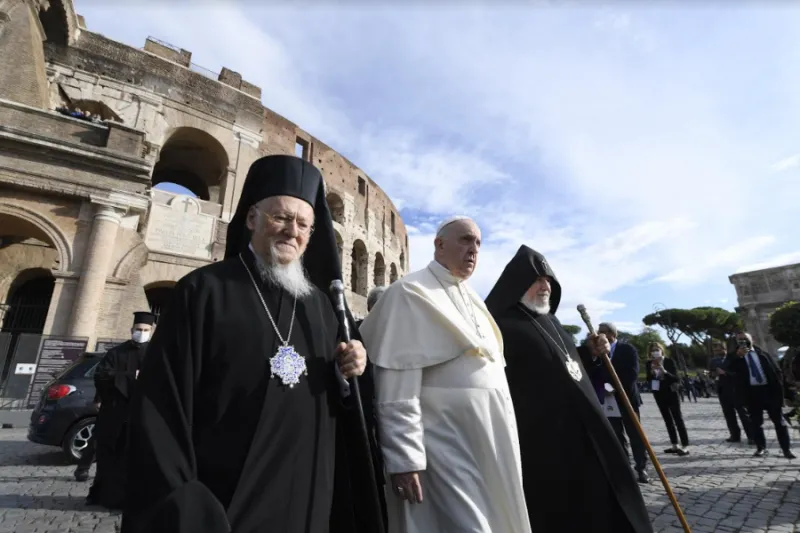
Rome, Italy, Oct 7, 2021 / 12:00 pm (CNA).
Pope Francis asked leaders of world religions to resist “the temptation to fundamentalism” for the sake of peace at an interreligious gathering Thursday in front of the Colosseum.
Peace “summons us to serve the truth and declare what is evil when it is evil, without fear or pretense, even and especially when it is committed by those who profess to follow the same creed as us,” the pope said Oct. 7.
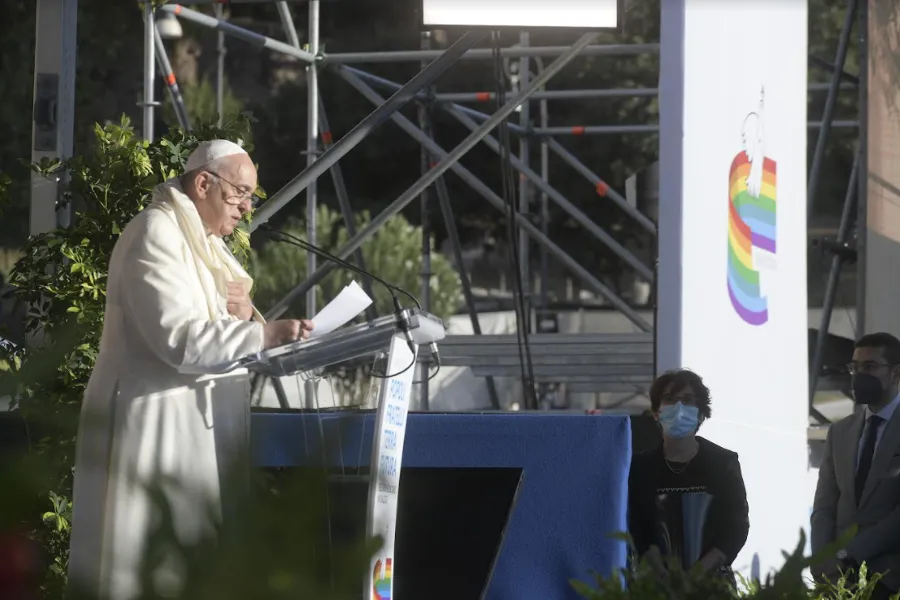
“For the sake of peace, please, in every religious tradition let us defuse the temptation to fundamentalism and every tendency to view a brother or sister as an enemy.”
Speaking on a stage together with Muslim, Jewish, Buddhist, and Hindu representatives, Pope Francis appealed for peace amid the world’s current conflicts.
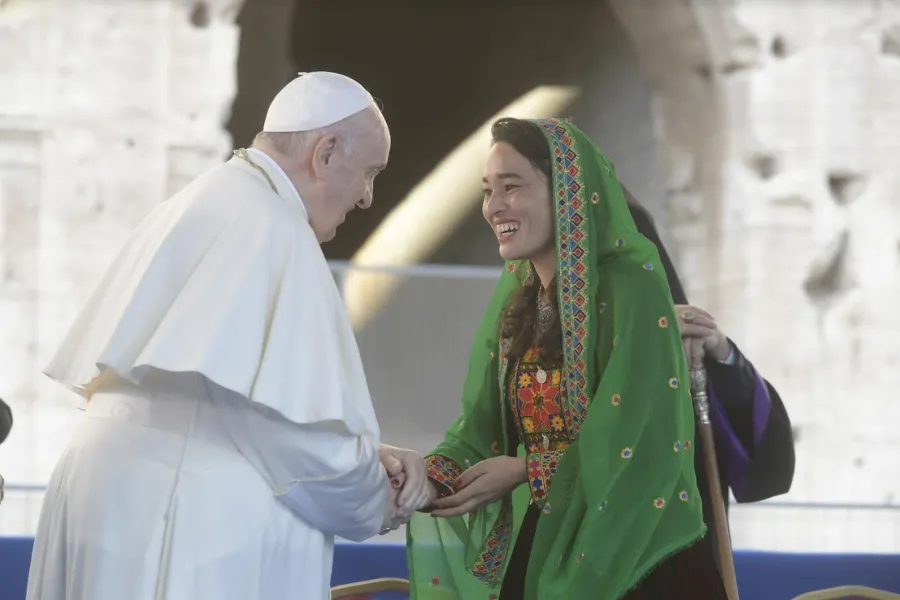
“Dear brothers and sisters, as believers it is our responsibility to help eradicate hatred from human hearts and to condemn every form of violence. Let us unambiguously urge that arms be set aside and military spending reduced, in order to provide for humanitarian needs, and that instruments of death be turned into instruments of life,” the pope commented.
“Fewer arms and more food, less hypocrisy and more transparency, more vaccines distributed fairly and fewer weapons marketed indiscriminately,” he said.
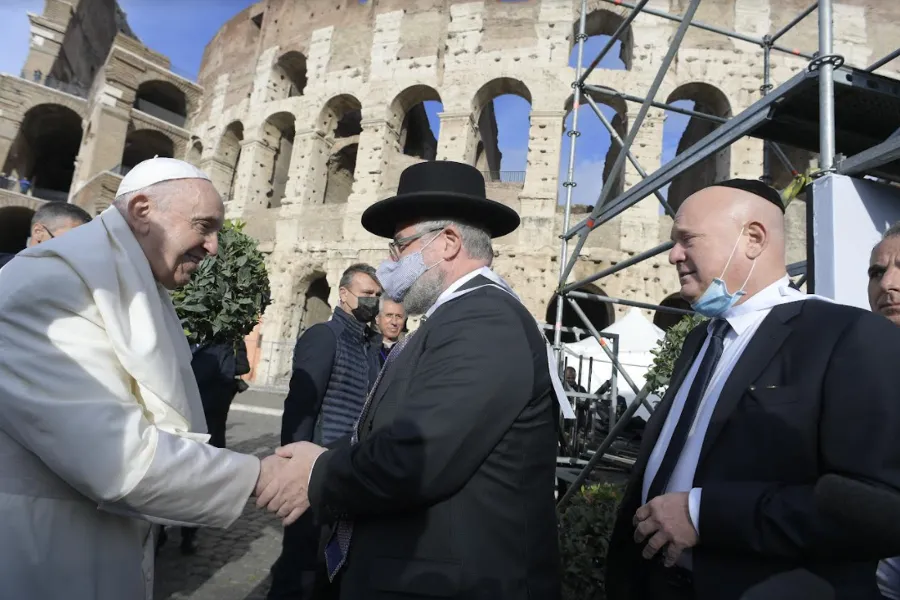
The pope called prayer a source of strength that “disarms hate-filled hearts.”
Ahmed el-Tayeb, the grand imam of al-Azhar in Cairo, Egypt, also spoke.
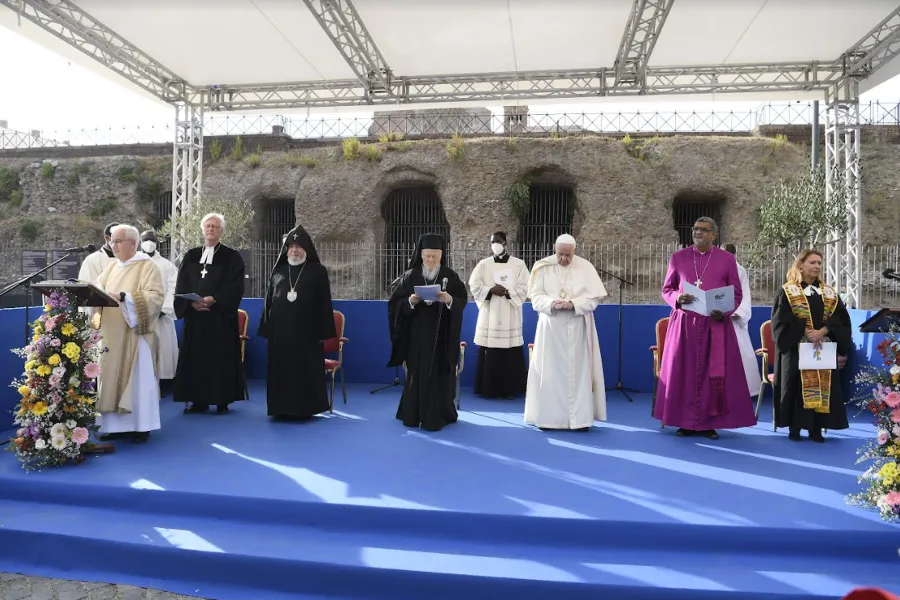
The Islamic scholar, who signed the landmark Document on Human Fraternity with Pope Francis in 2019, criticized the uneven distribution of COVID-19 vaccines throughout the world.
He said that “the world has suffered a setback despite the efforts made by religious institutions, their representatives and leadership, to foster a collaborative approach and exchange of goods, giving precedence to the public interest over private interests.”
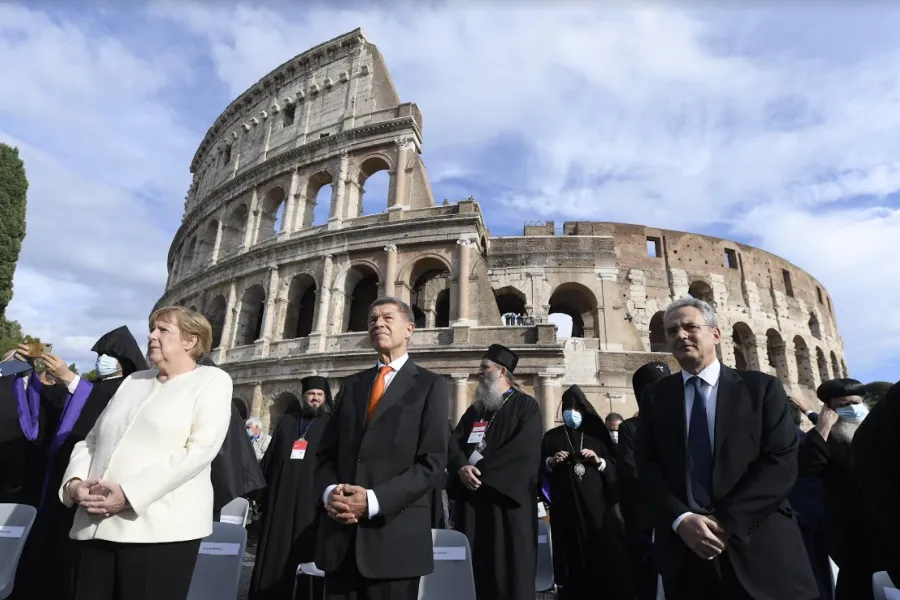
Pope Francis was speaking at the live-streamed closing ceremony of “Peoples as Brothers, Future Earth. Religions and Cultures in Dialogue,” the 35th event promoted by the Sant’Egidio Community in the “spirit of Assisi,” the interreligious gathering convened in St. Francis’ birthplace by Pope John Paul II in 1986.
In his address, the pope said: “Today, in a globalized society that sensationalizes suffering, yet remains incapable of sympathizing with it, we need to ‘construct compassion’ … We need to listen to others, make their sufferings our own, and look into their faces.”
“We cannot continue to accept wars with the detachment with which we watch the evening news, but rather make an effort to see them through the eyes of the peoples involved,” he said.
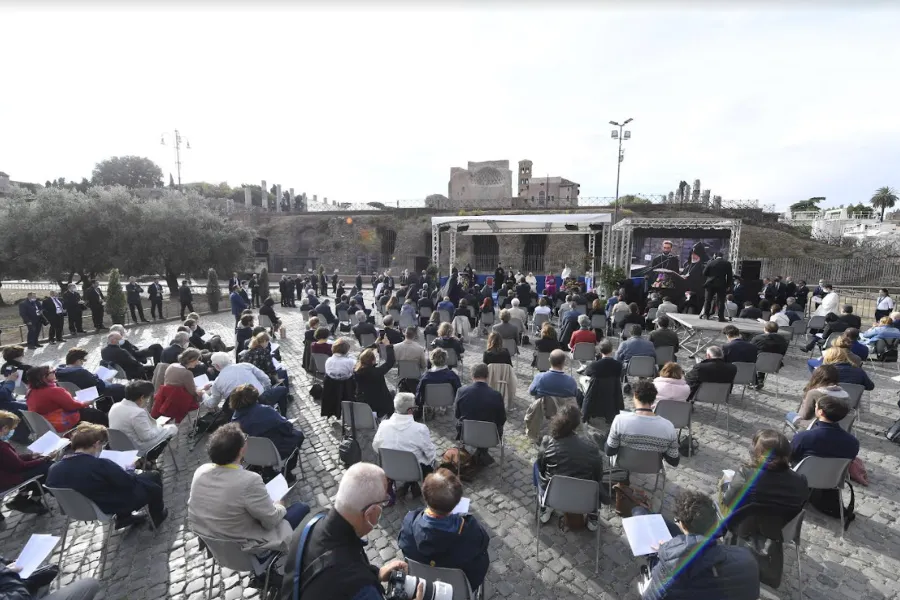
Christian leaders at the event included Ecumenical Patriarch Bartholomew I of Constantinople, spiritual leader of the world’s 300 million Orthodox Christians, Karekin II, leader of the Armenian Apostolic Church, and the German Lutheran Bishop Heinrich Bedford-Strohm. The event began with a prayer involving the Christian leaders.
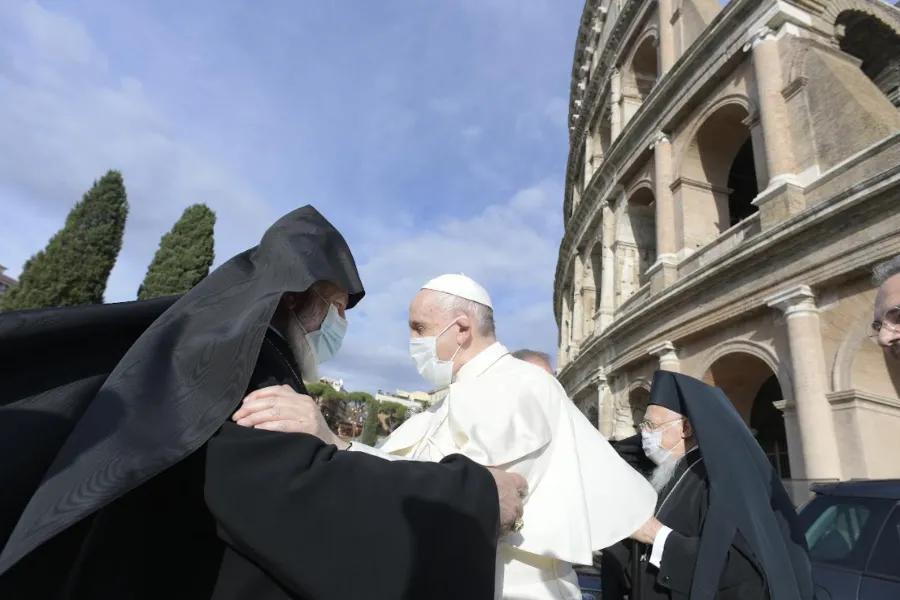
Representatives of world religions at the ceremony included Rabbi Pinchas Goldschmidt, the Chief Rabbi of Moscow and president of the Conference of European Rabbis, Shoten Minegishi, a Soto Zen Buddhist monk from Japan, Sayyed Abu al-Qasim al-Dibaji, of the World Pan-Islamic Jurisprudence Organization, and Edith Bruck, a Hungarian-born Jewish writer and Holocaust survivor.
Lakshmi Vyas, president of the Hindu Forum of Europe, and Jaswant Singh, a Sikh representative, also attended.
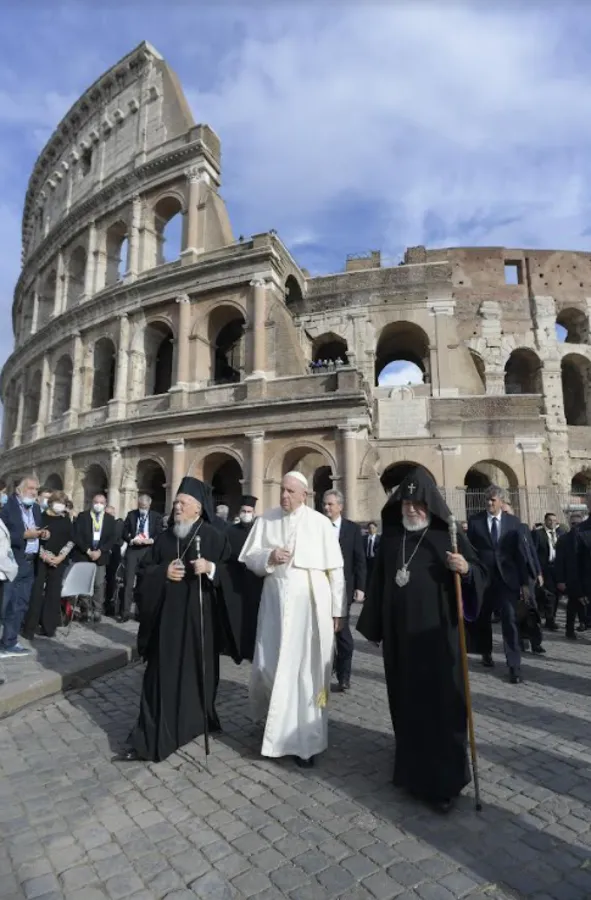
“As representatives of different religious traditions, all of us are called to resist the lure of worldly power, to be the voice of the voiceless, the support of the suffering, advocates of the oppressed and victims of hatred, people discarded by men and women on earth, yet precious in the sight of the One who dwells in heaven,” the pope said.
Pope Francis said that there was a link between the “dream of peace” and the need to care for creation.
“By cultivating a contemplative and non-predatory approach, the religions are called to listen to the groans of mother earth, which suffers violence,” he said.
The pope suggested that “unbridled individualism and the desire for self-sufficiency” had overflowed into “insatiable greed.”
“The earth we inhabit bears the scars of this, while the air we breathe is rich in toxins but poor in solidarity. We have thus poured the pollution of our hearts upon creation,” he said.
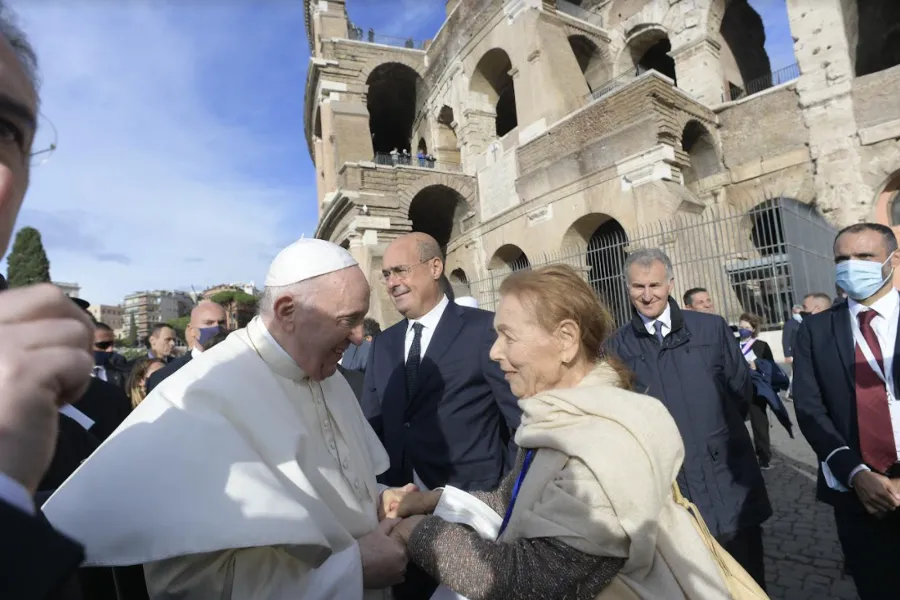
At the gathering Sabera Ahmadi, a young woman recently arrived from Afghanistan, read out an appeal for peace.
“The pandemic has shown how human beings are in the same boat, bound by profound threads. The future does not belong to those who squander and exploit, to those who live for themselves and ignore others,” she said.
“The future belongs to women and men who are in solidarity and to peoples who are brothers. May God help us to rebuild the common human family and to respect mother earth. In front of the Colosseum, symbol of greatness but also of suffering, let us reaffirm with the strength of faith that the name of God is peace.”
Also speaking at the event was Angela Merkel, who is due to step down as Germany’s chancellor following federal elections on Sept. 26. She had a private audience with the pope on the morning of Oct. 7.
The 67-year-old, who has led the European Union’s most populous nation since 2005, has been a frequent visitor to the Vatican since Pope Francis’ election in 2013.
The pope described the Lutheran pastor’s daughter as “one of the great figures of world politics” in an interview last month. He has received Merkel in private audience more often than any other head of state.
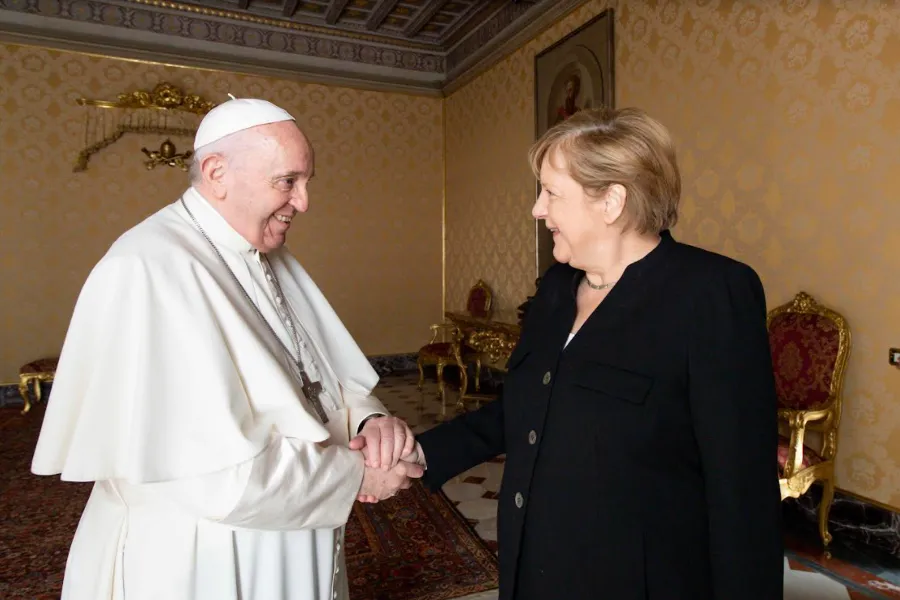
The two leaders spoke privately for about 45 minutes before exchanging gifts. The pope gave Merkel a small bronze image of the Holy Door in St. Peter’s Basilica along with copies of his writings. She gave him three volumes on the Bible and a book about Michelangelo.
In what is expected to be her farewell visit as chancellor, Merkel also met with the Vatican’s Secretary of State Cardinal Pietro Parolin and “foreign minister” Archbishop Paul Gallagher.
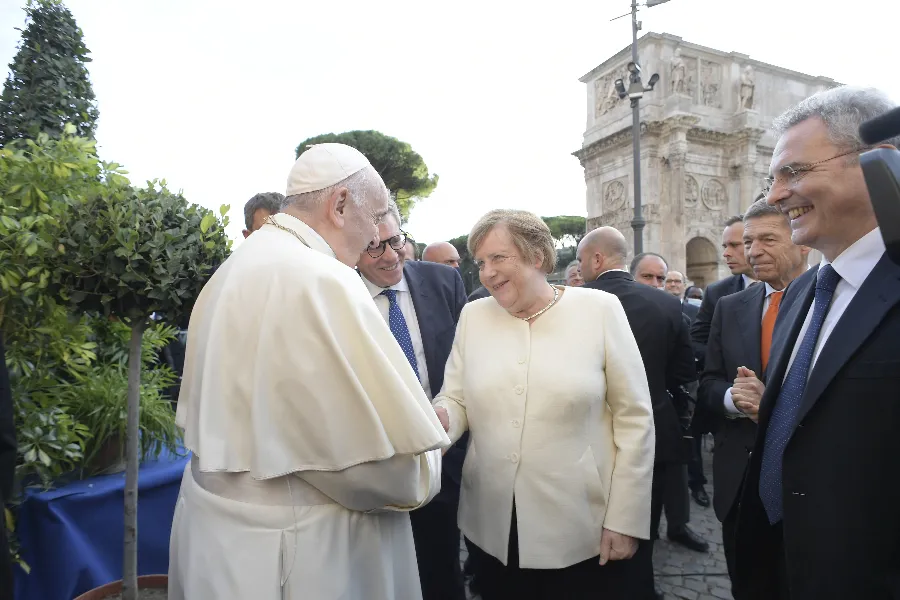
The Holy See press office said that “during the cordial discussions, appreciation was expressed for the good existing bilateral relations and the fruitful collaboration between the Holy See and Germany.”
It added: “The parties then turned their attention to matters of mutual interest in the international and regional spheres, agreeing on the advisability of relaunching cooperation to address the multiple crises underway, with particular reference to the consequences of the health emergency and migration.”
In his address outside of the Colosseum, Pope Francis said: “Yes, let us dream of religions as sisters and peoples as brothers! Sister religions to help peoples be brothers and sisters living in peace, reconciled stewards of creation, our common home.”
If you value the news and views Catholic World Report provides, please consider donating to support our efforts. Your contribution will help us continue to make CWR available to all readers worldwide for free, without a subscription. Thank you for your generosity!
Click here for more information on donating to CWR. Click here to sign up for our newsletter.




Nearly a century before the first Assisi event of 1986, and 127 years before today in Rome, a perspective already was floated on gatherings of world religions…
At the World Parliament of Religions held under the auspices of the World’s Columbian Exposition in Chicago in 1894, over one hundred authors from around the globe offered papers and remarks. Seven of these were Catholic, one of whom was his Eminence Cardinal Gibbons. In a less globalized world than today, Gibbons already gets it about what we call consumerism, but this too:
“…The Gospel of Christ, as propounded by the Catholic church, has brought not only light to the intellect, but comfort also to the heart. It has given us ‘that peace of Tod which surpasseth all understanding’—the peace which springs from the conscious possession of truth. It has taught us how to enjoy that triple peace which constitutes true happiness as far as it is attainable in this life—peace with God by the observance of His commandments; peace with our neighbor by the exercise of charity and justice toward him, and peace with ourselves by repressing our inordinate appetites and keeping our passions subject to the law of reason and our reason illumined and controlled by the law of God [….] Christ alone of all religious founders had the courage to say to His disciples: ‘Go, teach all nations [….].” (“The World’s Congress of Religions: The Addresses and Papers,” Chicago: Mammoth Publishing Co., 1894).
The difficulty of evangelization in a pluralist world (not to be abbreviated into “religious pluralism”) remains how to ENGRAFT the revealed Faith onto the aspirations of natural religions, while ALSO leavening their adherents above their remaining contradictions.
With Pope Francis, we do find common ground (yes, perhaps a global amniotic sack) in spaceship earth…but then, with Gibbons, what more is to be said and even witnessed? What more than “Mother earth”?
Dear Peter, thank you the double reminder of the beauty of our Religion and the contrast between the first 1958 years of the Catholic religion and the last 63 years. Babylonien weeping replaces Harps. Were it not for the network of Cardinal Rompolla and the Sankt Gallen Mafia would we not still be celebrating as was Gibbons the joys of the Catholic religion?
Fundamental Watson! [Watson had just asked Holmes if holding to fundamental truths is what today’s divided world considers divisive? Although Watson, dissatisfied with the response again asked, But Holmes! If the world is divided over truth then isn’t it truth itself that should unit it]. Fundamental Watson?
In my simplemindedness, I cannot grasp why our Holy Father is working so hard to confuse other religions, when, at the same time, he cannot get his own house in order. However, I do suspect that this gathering provides at least a brief distraction from all of the combined efforts within the Catholic Church, including his, to pulverize the Rock of Saint Peter into dust.
By the way, has Pope Francis actually defined “fundamentalism”, or is this just another code word used, ad nauseam, to attack the other leg of the stool, “Tradition”?
I think that Pope Francis has a rather vague and sometimes convenient understanding of “fundamentalism”. I discussed it a bit about five years ago in a piece titled “Francis and Fundamentalism” (Aug 9, 2016).
It seems we need a vocabulary of two words rather than only the one word (“fundamentalist”) used by Pope Francis…
Such that a Christian literalist of the (only “inspired”) Bible can be a “FUNDAMENTALIST,” while a Muslim literalist of the (“uncreated/dictated”) Qur’an can be a “ZEALOT.”
The added difference being that the New Testament preaches consistently the non-violent Commandments/Beatitudes, while the cobbled-together/self-contradictory Qur’an defines violence and now even terrorism as a component of peace…e.g., “Believers, make war on the infidels who dwell around you” (Q9:123); and “Make War on them until idolatry shall cease and Allah’s religion shall reign supreme” (Q 8:34, see also Q 2:187/191, 9:5, 47:4); “And fight with them until there is no persecution and religion is only for Allah” (Q 2:193); and “until all religions are for Allah” (Q 8:39). Jihad is both internal struggle and external conquest.
Is the Qur’an locked into parts of the folded-in Old Testament and the 7th-century Arabian Peninsula warrior code (not unlike the samurai Bushido “code of the warrior” in World War II Japan)? In the minds of ZEALOT Muslims (not all Muslims), then, is Pope Francis’ outreach toward a conflated “pluralism of religions” and “fraternity” viewed as a transitional step toward inevitable and universal Islam? (Roughly analogous to the equally ideological, inevitable, and universal “dictatorship of the proletariat” under Marxism/Leninism.)
Or, does simply asking these self-evident questions brand the questioner a “bigot, rigid,” and (potential) “fundamentalist”?
An added thought on the “fundamentalist” mind of the (zealot and self-contradictory) Bedouins of early Arabia, and later. This from T.E. Lawrence in his “Seven Pillars of Wisdom”…
“The fringes of their deserts were strewn with broken faith . . . .The Arabs said there had been forty thousand prophets: we had record of at least some hundreds.” [In contrast with Christians, and even our “fundamentalists,” the Bedouin] “[c]ould not look for God within him; he was too sure that he was within God. He could not conceive anything which was or was not God, Who alone was great [….]
“…In the very outset, at the first meeting with them, was found a universal clearness or hardness of belief, almost mathematical in its limitations, and repellent in its unsympathetic form. Semites had no half-tones in their register of vision. They were a people of primary colours, or rather of black and white, who saw the world always in contour. They were a dogmatic people, despising doubt, our modern crown of thorns. They did not understand our metaphysical difficulties, our introspective questionings. They knew only truth and untruth, belief and unbelief, without our hesitating retinue of finer shades . . . [but then] They inhabited superlatives by choice. Sometimes inconsistencies seemed to possess them at once in joint sway; but they never compromised: they pursued the logic of several incompatible opinions to absurd ends, without perceiving the incongruity.”
Or maybe the definition of “fundamentalism” should less left-vs-right and much more inclusive… including EVERYONE who would separate from our over-complicated and overwhelming world by grasping one “ism” insignia or another while flinging one-word epithets over their shoulders.
By this definition of fundamentalism, as ONE-WORDISM, anyone who retreats into identity politics (even national-ism!) is also a fundamentalist, or anyone who dreams of a disembodied and amnesiac utopia is a fundamentalist, or anyone who brands others as “homophobic” or “Islamophobic” or “xenophobic” is highly eligible fundamentalist too—-or even anyone who dismisses reasonable critics in one word as “bigots” and “rigid.”
When we “get the ‘ell out,” the seductive insignia of ONE-WORLDISM overreaches as the most ubiquitous one-wordism of all—-just another “fundamentalism,” but flipped into progressive disguise.
A core tenet of (Christian) Fundamentalism is Sola Scriptura (Bible alone, without regarding with spoken tradition) and a literal interpretation of every single passage of the Bible. Since Catholics accept Tradition as well as scripture (in fact the Bible is spoken tradition taken down and put to paper) and that the Bible is the inspired Word of God, with some passages to be interpreted literally but others symbolically, it is therefore impossible for a Catholic to be a “Fundamentalist”.
The problem with the Church currently is not “rigidity” and “Fundamentalism” but Laxity on the part of our current Pope and his allies in the Hierarchy.
I believe that fundamentalism, in all cases, comes down to form.
Catholicism and Islam don’t conflict when it concerns which “God” to worship. The conflicts arise in “how” we are to worship. For two millennia, we Catholics had a nearly unchanging / unchangeable mode of worship, which is the Mass. This Mass was universal in language, style, format, context and, most especially, on its emphasis, which is the Holy Eucharist. Luther & Calvin came along and changed not simply the style, format, and content, but they eliminated the emphasis altogether. So, Christendom in the West was split asunder. 500 years later, Vatican II said that we needed a new way to worship, i.e., another change in form. This was not as bumpy a change in our form of worship as was the reformation, but there was the inevitable split in the Body of Christ. We now have two forms of worship – pre and post Vatican II.
Several decades after Vatican II, Pope Francis dictates, in absolute and irrevocable terms, that the most ancient and cherished of the two forms, the Traditional Latin Rite, which has survived unscathed since the time of the Apostles, is now forbidden and, indeed, henceforth abolished from the face of the earth.
It comes down once again to what is written in Scripture, “woe to him who calls evil good, and good evil”.
For our part, we must cling tightly to what is true, for Jesus is the way, the truth and the life. Anything else is from the evil one.
Expecting precision in philosophical thinking from Pope Francis is a fool’s game.
We read: “Catholicism and Islam don’t conflict when it concerns which “God” to worship,” and then “For our part, we must cling tightly to what is true, for Jesus is the way, the truth and the life. Anything else is from the evil one.”
For the sake of dialogue, do unitarian monotheism (Islam) and the Trinitarian an incarnational God represent a “conflict” or at least a question as to “which ‘God’ we worship”?
This question, for whatever it might be worth (or not), brings us back to Rahner’s “anonymous Christian”—the fact that natural religions of the world at least point toward the Logos, in that all men are working from the innate standpoint of reason as part of our universal human nature.
This degree of built-in fraternity is appealed to by Pope Francis in our otherwise increasingly disjointed world. The contact point with (very sectarian) Islam is the imam of al-Azhar University in Cairo, A.D. 970, the first center of (Islamic) learning, which predates Western-world universities, e.g., the University of Paris, c. A.D. 1150, by centuries.
The question within Islam, then, becomes whether human reason has a consistent place in the universe, or not. In the “dictated” Qur’an and the hadiths Allah is so inscrutable that, finally, his actions are arbitrary (not even analogous to human reason). Such that what we in the West regard as reasonable (faith & reason!) is dismissed as arbitrary delusion. Things could just as well have been otherwise (belief in fatalism!). And within history, then, the later actions of Allah “abrogate” the former. Such that the contradictions of jihad, for example, (as both inner-struggle as preached in Mecca and outer-conquest as demonstrated later in Medina and beyond) are entertained simultaneously.
Does this unreasoning belief in “abrogation” replace human reason’s non-demonstrable first principle of non-contradiction? Or not? A non-Christian and pluralist “hermeneutics of discontinuity,” and fatally the same God after all?